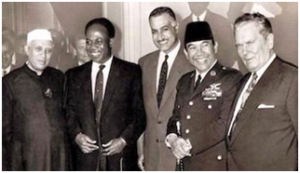Ethics Theory, TLP-UPSC Mains Answer Writing
Q.20. Examine the ideological foundation and legacy of Bandung Conference in shaping post-colonial internationalism. (250 words, 15 marks)
Introduction
The 1955 Bandung Conference was the first major meeting of newly independent Asian and African countries. It promoted unity among them and became the starting point for the Non-Aligned Movement during the Cold War.
Body
Ideological Foundations of the Bandung Conference
- Anti-Colonial Solidarity: United newly independent nations against imperialism and racial discrimination.
- Non-Alignment Principle: Advocated an independent foreign policy, avoiding military blocs of the US or USSR.
- Peaceful Coexistence: Emphasised sovereign equality, mutual respect, and resolution of conflicts through dialogue.
- Economic Cooperation: Sought collective development through South-South trade, technology, and resource-sharing.
- Cultural Respect: Encouraged preservation of indigenous cultures against westernisation and cultural imperialism.

Legacy and Long-Term Influence
- Non-Aligned Movement (NAM): Bandung paved the way for NAM (1961), with leaders like Nehru, Nasser, Tito, institutionalising neutrality in global politics.
- South-South Frameworks: Inspired G77, UNCTAD, and later BRICS—platforms for equitable global economic participation.
- Voice for the Global South: Enabled third world countries to articulate alternative development visions and demand reforms in global institutions.
- India’s Global Role: Nehru’s leadership at Bandung helped India emerge as a moral force advocating disarmament, decolonisation, and peaceful coexistence.
- Modern Relevance: Bandung’s spirit echoes in climate justice, vaccine equity, and demands for reformed multilateralism in today’s geopolitics.
Conclusion
“In many ways, the Bandung spirit lives on in India’s leadership of the Global South,” noted EAM S. Jaishankar. Today, India champions multipolarity, sovereignty, and development justice—values first articulated by post-colonial nations in Bandung.














